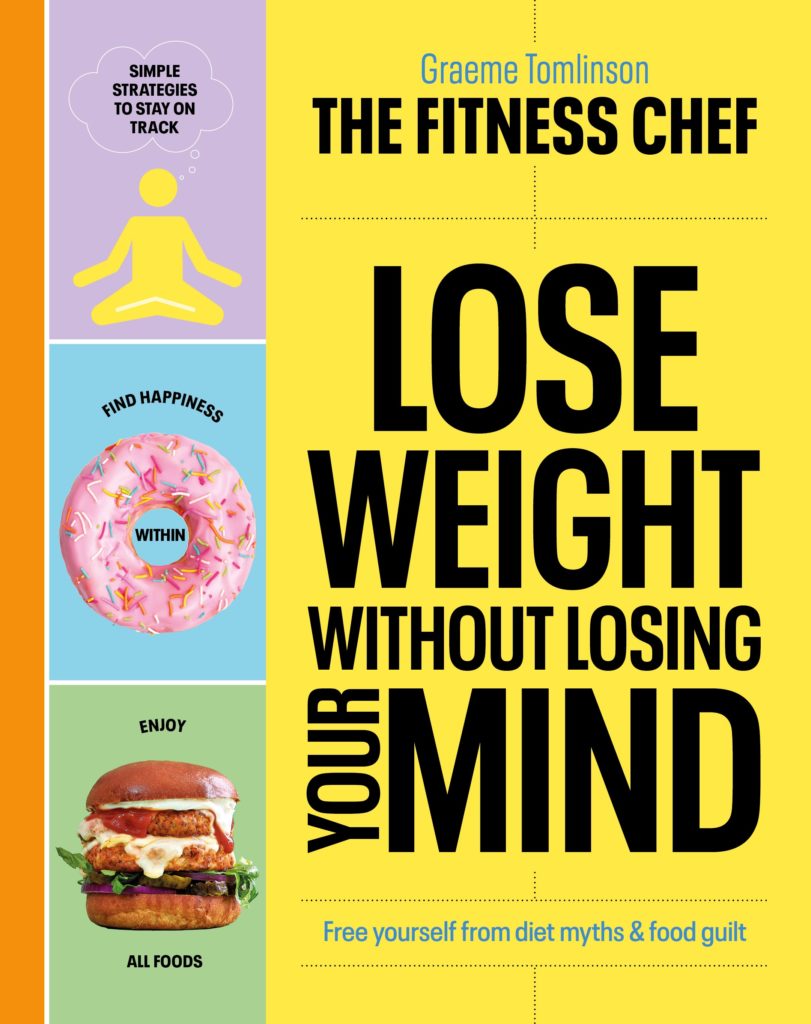
If you started a diet at the beginning of 2022, chances are you’ll have long ditched it by now.
Incredibly, most people do by January 12. It’s no wonder really, since most eating regimes, from Paleo to Keto, are complicated, torturous and pretty unsustainable unless you’re highly organised and have willpower of steel.
This is a good time to look at the new book, Lose Weight Without Losing Your Mind, from Aberdeen-based nutritionist and fitness coach, Graeme Tomlinson, aka The Fitness Chef, who has over a million followers on Instagram (@thefitnesschef_).
There is no juicing, drinking shakes instead of meals, ditching carbs, eating with tiny knives and forks (blame Elizabeth Hurley for that old trick), or using words like detox. It is that very rare thing in the world of weight loss. Sensible.
“For years now I’ve seen diet myths, disordered eating and miserable dieting methods dictate people’s lives and negatively affect their mental health,” says Tomlinson. “ With this book I want to empower people with the tools to achieve their goals, and know that they don’t have to climb the proverbial mountain to get there”.
Although there are 15 new recipes, including teriyaki chicken and an on-the-go breakfast smoothie, at the back of the book, this is more of a self-help read than a cooking one, with plenty of Tomlinson’s signature infographics, which he also uses on social media.
Essentially, it’s an anti-diet diet book.
“Most of the diets and products people are exposed to aren’t necessary, and can end up being harmful to physical and mental health,” says Tomlinson, who prescribes a more sustainable method of weight loss.
The chapters include “How to avoid being sucked into diet tribes”, “Why there are no good or bad foods” and “Losing weight and finding happiness within”. In these, Tomlinson discusses various “diet cults”, intermittent fasting and biohacking, and quickly unpicks the pseudoscience with evidence. It seems that sugar isn’t more addictive than cocaine, and carbs aren’t the enemy. Ditching them could help you lose weight, but only because eliminating entire food groups might give you a calorie deficit over time.
He’s also not an advocate of slimming clubs, who do weigh-ins, forbid certain food types and expect a monthly membership fee for the privilege.
There is a lot of debunking of myths, and you wonder how everyone got so confused in the first place.
“I think it comes down to the amount of information available and the varying agendas of the dieting industry to make money. One minute we’re told to cut carbs, the next we need to do intermittent fasting. We are told specific foods cause cancer or cure cancer. So much of this stuff is communicated without any context or the body of evidence available”, says Tomlinson, who has also written Eat What You Like & Lose Weight for Life, and recipe book Still Tasty. “I devote an entire chapter to help people build a knowledge shield against the ‘charlatan snake pit’ – empowering them to focus on what really matters for fat loss and improved health”.
If you follow Tomlinson’s advice, you can eat what you want. Even pizza isn’t out of bounds, as long as you balance your intake over time. After all, you eat 21 meals over seven days, and one calorific choice isn’t going to scupper your whole week.
“Fortunately, the basics of losing body fat are theoretically very simple (consume fewer calories than you burn each day). But I do get frustrated when people ignore this crucial principle and opt for a two week detox or ultra low calorie diet that teaches them nothing about losing fat or improving their health long term”, says Tomlinson, who is partial to a double chicken pitta at Aberdeen’s Nandos. “All these methods seem to do is create disordered and emotional dietary patterns. These are hugely detrimental to somebody’s mental health and they are either miserable achieving their goal, or never achieve their goal at all. The pressure they heap on people creates unnecessary anxiety and guilt”.
The diet industry seems to be especially booming at the moment. That’s partially because it’s January, but most of us have also still got that lockdown muffin top to contend with. Then there’s social media, which seems to be full of weight-loss hacks and people who are obsessed with their diet. It can all breed an unhealthy fixation with eating the “right” things when, as Tomlinson’s book explains, there are no good or bad foods.
“I often find that if I post a message that says it’s okay to eat any food in moderation, including heavily processed, nutrient sparse foods, that some will criticize the message because they can’t see past their obsession”, says Tomlinson. “Orthorexia is an eating disorder where one feels they need to eat the highest quality foods at all times. There are many social media accounts with hundreds of thousands of followers spreading these distorted views of what a balanced diet entails. The reality is that less nutritious foods that you love won’t ruin your health as long as you eat plenty of nutrients and take care of things like sleep and stress. In fact, eating these foods will likely support your mental health long term and make you stick to your goals as your enjoyment increases”.
Pass us a Crunchie bar.
The Fitness Chef: Lose Weight Without Losing Your Mind by Graeme Tomlinson (Ebury Press, £16.99) is published January 20




